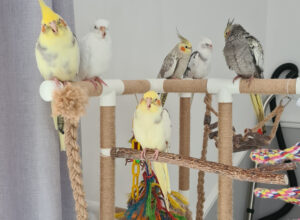Identifying Common Cockatiel Illnesses
Key Takeaways
- Early Detection: Recognising the signs of common illnesses in cockatiels can lead to quicker treatment and recovery.
- Preventive Care: Regular veterinary check-ups and proper care are crucial in preventing many common illnesses.
- Essential Care: Understanding and providing for your cockatiel’s basic needs—such as diet, exercise, and a safe environment—is foundational to their health.
- Immediate Action: If you suspect your cockatiel is ill, seek veterinary care immediately to ensure the best outcome.
Cockatiels are among the most popular pet birds, known for their affectionate nature and captivating personalities. As a cockatiel owner and enthusiast, ensuring the health and happiness of your feathered friend is a top priority. However, like all pets, cockatiels can fall ill, and recognising the signs of common illnesses is crucial for their well-being. This comprehensive guide will help you identify symptoms of common cockatiel illnesses, understand their causes, and take appropriate action to ensure your bird receives the care it needs.
Cockatiels, with their distinctive crests and charming whistles, bring joy to households around the UK. But their care extends beyond providing food and water; it involves vigilant observation for signs of illness. Early detection and treatment can make a significant difference in the outcome of many common avian diseases.
Recognising Signs of Illness in Cockatiels
Cockatiels often hide their illnesses, a survival instinct from their wild ancestors. Therefore, by the time symptoms become apparent, the bird might already be significantly ill. Key signs include:
- Changes in Behaviour: Lethargy, aggression, or changes in noise or sound patterns.
- Feather Problems: Plucking, fluffing up, or abnormal moulting.
- Respiratory Issues: Wheezing, sneezing, or nasal discharge.
- Digestive Disturbances: Changes in appetite, weight loss, or abnormal droppings.
- Physical Abnormalities: Swellings, lameness, or changes in eye appearance.
Common Cockatiel Illnesses and Their Symptoms
Respiratory Infections
- Symptoms: Difficulty breathing, wheezing, nasal discharge.
- Causes: Bacterial, viral, or fungal infections; poor air quality.
- Treatment: Veterinary diagnosis and antibiotics, antifungals, or supportive care as needed.
Psittacosis (Parrot Fever)
- Symptoms: Respiratory distress, lethargy, eye discharge.
- Causes: Chlamydia psittaci bacteria.
- Treatment: Antibiotics prescribed by a vet, often doxycycline.
Giardiasis
- Symptoms: Diarrhea, weight loss, feather plucking.
- Causes: Giardia parasites.
- Treatment: Antiparasitic medication and environmental decontamination.
Preventive Measures and Care
Preventive Care and Recommended Actions
| Preventive Measure | Recommended Action |
|---|---|
Regular Veterinary Check-ups | Schedule annual visits or more frequently if recommended. |
| Balanced Diet | Provide a varied diet, including pellets, seeds, and safe fruits and veggies. |
| Clean Living Environment | Regular cage cleaning and maintenance to prevent disease. |
| Mental and Physical Stimulation | Ensure toys, perches, and daily interaction for exercise and mental health. |
Essential Care Links:
When to Seek Veterinary Care
If your cockatiel shows any signs of illness, immediate veterinary attention is necessary. Birds can deteriorate rapidly, so prompt action is essential.
“The key to a healthy cockatiel is not just in treating illnesses but in preventing them through proper care and nutrition.” – Avian Veterinarians
Conclusion
Caring for a cockatiel requires attention to their health and well-being. Recognising the signs of common illnesses and understanding how to prevent these conditions are vital components of responsible pet ownership. By providing a loving and attentive environment, you can ensure your cockatiel remains a happy, healthy companion for years to come.
Additional Resources
For more detailed information on cockatiel care, including diet, cage setup, and enrichment activities, visit the following links:
Remember, a well-cared-for cockatiel is a happy cockatiel. Regular check-ups, a proper diet, and a clean, engaging environment are the cornerstones of good health.

